#HUAC
Explore tagged Tumblr posts
Text

If you want to read more about Seeger and HUAC.
135 notes
·
View notes
Text

Ronald Reagan, an FBI informant, testifies before the House Un-American Activities Committee against other his fellow actors. 1947
He wasn't JUST the worst president ever (maybe 2nd worst after trump?)...he was also a horrible human being that ruined people's lives when he was still an actor.
107 notes
·
View notes
Text
Nobody rocks a sweater vest like this man.

Please note he continues the tradition of drinking in character.
#shaun evans#here in america#orange tree theatre#he’s so hot#hot damn evans#endeavour morse#itv endeavour#endeavour itv#epic acting#elia kazan#Arthur miller#huac#curly hair don’t care#curly haired Gadg is the best Gadg
49 notes
·
View notes
Text

Dashiell Hammett, May 27, 1894 – January 10, 1961.
Being sworn in by Senator Joseph McCarthy just before refusing to cooperate with the House Un-American Activities Committee on March 26, 1953. Photo by Hank Walker.
72 notes
·
View notes
Text


The “Hollywood Ten″ were cited for contempt of Congress #OnThisDay in 1947.
These men had refused to cooperate at hearings dealing with communism in the movie industry held by the House Un-American Activities Committee (HUAC). They were sentenced to one year in jail.
25 notes
·
View notes
Text

From the shoulders of cheering, singing supporters, Dalton Trumbo and John Howard Lawson make farewell speeches as they prepare to leave Penn Station for Washington, where they were to start serving one-year prison terms for contempt of Congress, June 9, 1950. The "Hollywood 10" had appeared before the House Un-American Affairs Committee in October, 1947, and refused to answer questions regarding their possible affiliations with the Communist Party. After they were released, they were blacklisted by the Hollywood studios.
Photo: Marty Lederhandler for the AP
#vintage New York#1950s#Marty Lederhandler#Hollywood 10#McCarthyism#Dalton Trumbo#John Howard Lawson#red baiting#HUAC#June 9#9 June#witch hunt
54 notes
·
View notes
Text

Minutes of the House Committee on Un-American Activities, August 6, 1964
Record Group 233: Records of the U.S. House of RepresentativesSeries: Committee PapersFile Unit: Minutes of Full Committee and Subcommittee Meetings of the Internal Security Committee During the 80th through 93rd Congresses
COMMITTEE ON UN-AMERICAN ACTIVITIES
August 6, 1964
The Committee on Un-American Activities met in executive session on August 6, 1964, in Room 225 of the Cannon House Office Building at 3:30 o'clock p.m. The following members of the Committee were present:
Edwin E. Willis, Chairman August E. Johansen
Joe R. Pool Henry C. Schadeberg
Donald C. Bruce
The staff members present included Francis J. McNamara, director; Frank S. Tavenner, Jr., general counsel; Alfred M. Nittle, counsel; Donald T. Appell, chief investigator; and Juliette P. Joray recording clerk.
The meeting was called to order by the chairman at 3:30 o'clock p.m.
The Committee considered the release of the testimony of Dr. James H. Robinson who appeared before the Committee in executive session on May 5, 1964. There being no objection it was so ordered.
Mr. Pool, chairman of the subcommittee holding hearings in the matter of Entry of Aliens in the United States under waiver of ineligibility (specifically, the Yasui case), again reported to the full committee the receipt of a request from Secretary of State Dean Rusk that he be permitted to testify and after a full discussion, a motion was made by Mr. Johansen, seconded by Mr. Bruce, and carried unanimously, that the subcommittee accept the Secretary's invitation to testify.
The meeting adjourned at 3:55 o'clock p.m.
E. E. Willis
Chairman
Juliette P. Joray
Recording Clerk
26 notes
·
View notes
Text
i still cant get over the fact hua cheng bullies his own sword...
#tgcf#heavens official blessing#mxtx tgcf#tgcf shitpost#huac#hua cheng#eming#e ming#shitpos#shitpost
35 notes
·
View notes
Text

The Red Scare
Newly Declassified National Security Agency Memo Reveals That U.S. Government Knew Ethel Rosenberg Was Not A Spy Long Before Her Trial and Execution
A newly declassified document clarifies the truth. In August 2024, the Rosenberg sons obtained a handwritten memo from August 1950 authored by the NSA’s chief analyst, Meredith Gardner. He wrote that, based on Soviet intelligence, Ethel knew about Julius’ espionage work but “due to illness she did not engage in the work herself.” This document confirms what other sources such as the FBI had already indicated: Ethel was not a spy and “did not engage in the work” of espionage and – most importantly – U.S. government officials knew it. They knew it when FBI agents arrested Ethel on Aug. 11, 1950. They knew it when the jury convicted her nine months later. They knew it when the judge sentenced her to death on April 5, 1951. And they knew it when prison officials executed her on Friday, June 19, 1953. Now, Michael and Robert Meeropol are using the declassified memo to urge Biden “to exonerate (Ethel) Rosenberg by issuing a formal presidential proclamation saying that she was wrongly convicted and executed.
#ethel rosenberg#rosenberg trial#red scare#communism#hoover#huac#national security agency#nsa#cold war#1950s#50s
9 notes
·
View notes
Text

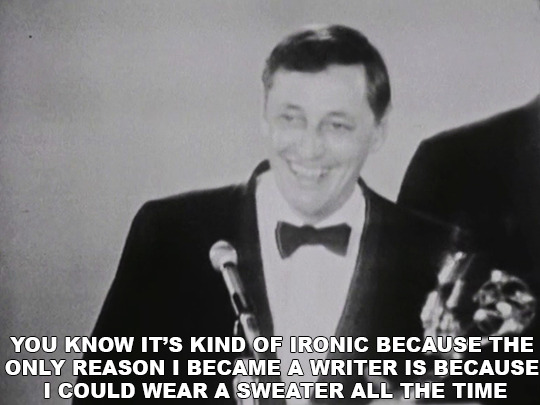
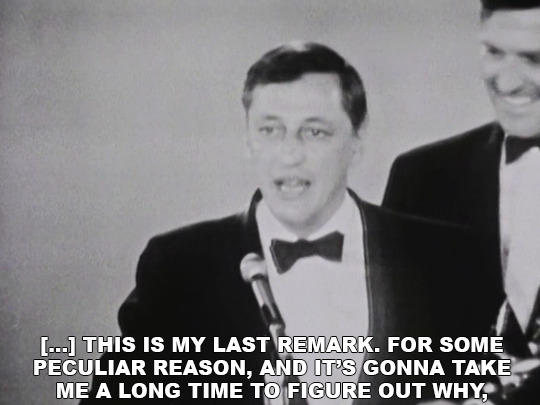
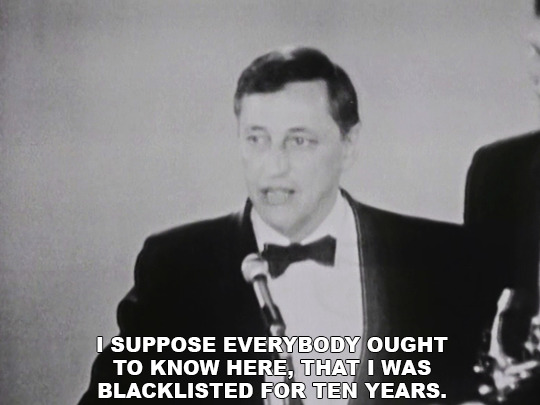
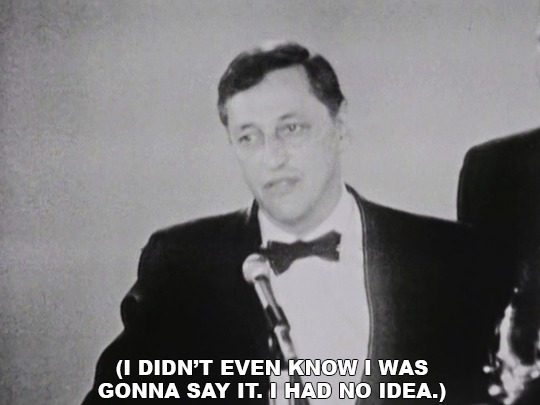
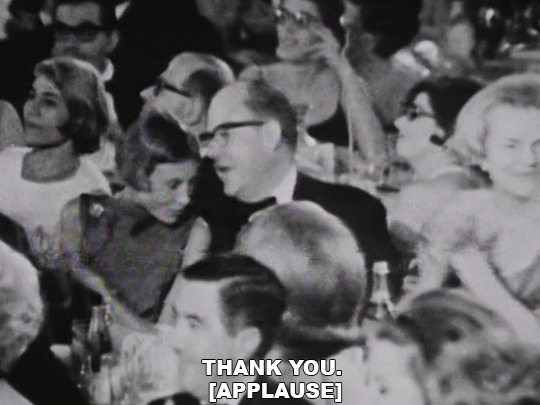
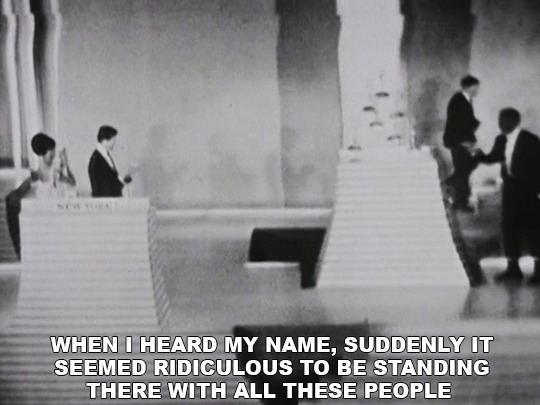

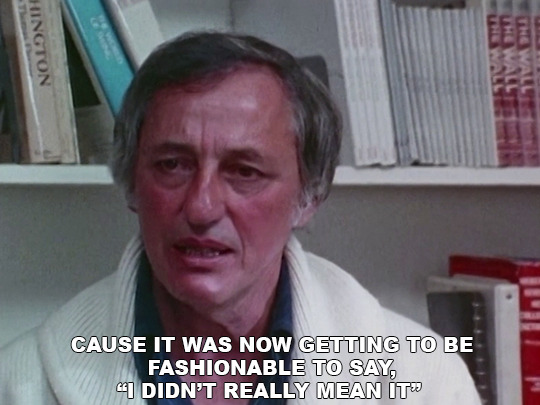
Hollywood on Trial (1976, David Helpern)
The film chronicles the 1947 hearings of the House Un-American Activities Committee (HUAC), with a focus on the Hollywood Ten directors, screenwriters and producers cited for contempt of Congress and blacklisted by the movie industry after refusing to answer questions about their alleged involvement with the Communist Party.
#hollywood on trial#david helpern#the hollywood ten#huac#house of unamerican activities committee#mccarthyism#red scare#anti communism#hollywood#awards season#millard lampell#documentary#post#screencaps
26 notes
·
View notes
Text



1957.
US House of Representatives cites playwright Arthur Miller for contempt.
55 notes
·
View notes
Text


alger hiss huac hearing, 1948
#this will crop so badly on mobile#richard nixon#alger hiss#hiss case#huac#house of un-american activities committee#history#potus#us history#us presidents#40s#video#gifset#mine
9 notes
·
View notes
Text
The first systematic Hollywood blacklist was instituted on November 25, 1947, the day after ten writers and directors were cited for contempt of Congress for refusing to testify before the House Un-American Activities Committee (HUAC). The blacklist denied employment to entertainment professionals due to alleged Communist ties or sympathies.

24 notes
·
View notes
Text
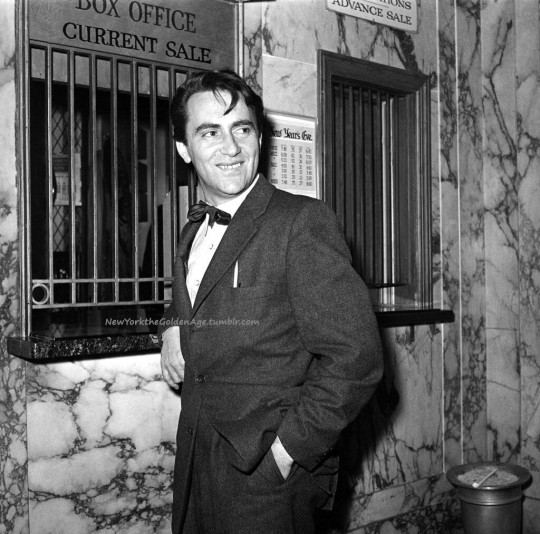
A youthful Joseph Papp at the box office of the Broadway play Comes a Day, for which he was production stage manager. The picture was taken on November 12, 1958, the day he learned that an arbitrator had ruled in his favor in his complaint against CBS. The network had fired him after he refused to answer questions of a congressional committee probing "un-American activities," i.e., Communism. The arbitrator ordered CBS to re-hire him and pay him $1,500 in back wages (around $16,000 in today's dollars).
Photo: John Lindsay for the AP
#vintage New York#1950s#John Lindsay#Joseph Papp#Joe Papp#HUAC#Nov. 12#12 Nov.#red-baiting#McCarthyism
49 notes
·
View notes
Text

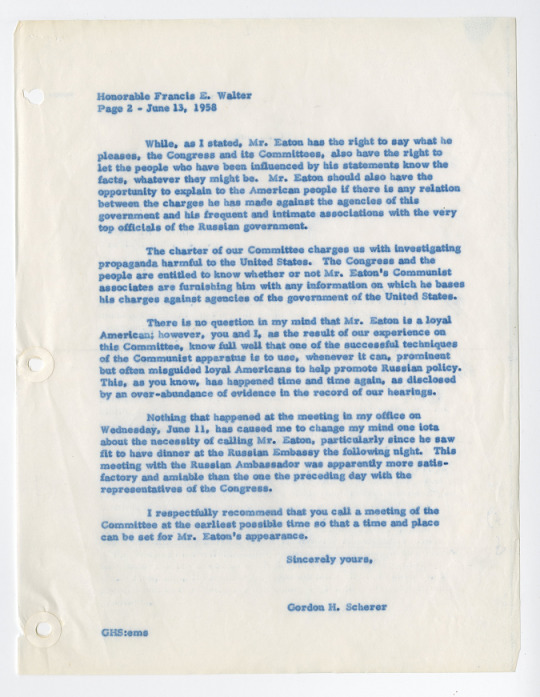
The House Un-American Activities Committee discuss subpoenaing Cyrus Eaton, a businessman who criticized U.S. Cold War policy and called for nuclear disarmament, June 13, 1958.
Record Group 233: Records of the U.S. House of Representatives
Series: Committee Papers
File Unit: Minutes of Full Committee and Subcommittee Meetings of the Internal Security Committee During the 80th through 93rd Congresses
Transcription:
GORDON H. SCHERER COMMITTEES:
FIRST DISTRICT, OHIO UN-AMERICAN ACTIVITIES
PUBLIC WORKS
CINCINNATI OFFICE:
1704 CAREW TOWER ADMINISTRATIVE ASSISTANT
DUnbar 1-9312 ELIZABETH M. SCHURENT
[[in calligraphy]] Congress of the United States
House of Representatives
Washington, D.C.
June 13, 1958
[[blue ink]] Honorable Francis E. Walter, Chairman
Committee on Un-American Activities
House Office Building
Washington 25, D.C.
Dear Mr. Chairman:
On May 7, following the much - discussed television
appearance of Mr. Cyrus Eaton on the Mike Wallace show, I
made a speech at Hunter College in New York City in which I
commented on Mr. Eaton's charges against the security agencies
of this country. Enclosed is a copy of that part of the speech
dealing with the Eaton matter which I inserted in the Congressional
Record on May 12, entitled "Aid and Comfort to the Enemy."
Subsequently on May 15 I wrote you, sending
copies to the other members of the Committee
on Un-American Activities,
stating that in my opinion the Committee had no alternative except
to call Mr. Eaton and ask him to tell us what information he had
to support his charges against the security agencies of this
country, including the Federal Bureau of Investigation.
It has been pointed out that Mr. Eaton had a perfect right
under our Constitution to make whatever attack he saw fit against
these agencies even though because of his prominence such charges
were used by the Communist propaganda apparatus all over the
world to the detriment of the United States. It has been made
clear that, if there is any basis for Mr. Eaton's charges, then
our Committee has the duty under its charter and under the rules
of the House to investigate the operation of any agency in the
executive branch which would be operating in the manner suggested by
Mr. Eaton, and , if his charges were sustained by the evidence, to
recommend to the House the necessary legislation to correct such
practices.
[page 2]
Honorable Francis E. Walter
Page 2 - June 13, 1958
While, as I stated, Mr. Easton has the right to say what he pleases, the Congress and its Committees, also have the right to let the people who have been influenced by his statements know the facts, whatever they might be. Mr. Eaton should also have the opportunity to explain to the American people if there is any relation between the charges he has made against the agencies of this government and his frequent and intimate associations with the very top officials of the Russian government.
The charter of our Committee charges us with investigating propaganda harmful to the United States. The Congress and the people are entitled to know whether or not Mr. Eaton's Communist associates are furnishing him with any information on which he bases his charges against agencies of the government of the United States.
There is no question in my mind that Mr. Easton is a loyal American; however, you and I, as the result of our experience on this Committee, know full well that one of the successful techniques of the Communist apparatus is to use, whenever it can, prominent but often misguided loyal Americans to help promote Russian policy. This, as you know, has happened time and time again, as disclosed by an over-abundance of evidence in the record of our hearings.
Nothing that happened at the meeting in my office on Wednesday, June 11, has caused me to change my mind one iota about the necessity of calling Mr. Eaton, particularly since he saw fit to have dinner at the Russian Embassy the following night. This meeting with the Russian Ambassador was apparently more satisfactory and amiable than the one the preceding day with the representatives of the Congress.
I respectfully recommend that you call a meeting of the Committee at the earliest possible time so that a time and place can be set for Mr. Eaton's appearance.
Sincerely yours,
Gordon H. Scherer
GHS:ems
33 notes
·
View notes
Note
How true, or untrue were the communist accusation Walt leveled at his employee's?

Pretty much entirely bullshit.
While there were Communist organizers in the labor movement in the 1940s, they were in CIO unions like the UE (electrical workers), ILWU (longshoremen on the West Coast), Mine Mill, and the like.
The Screen Cartoonist's Guild was affiliated with the AFL, the more politically moderate union federation, and was a thoroughly conventional Hollywood union. If you look at the issues that were at stake in the 1941 strike, they were bread-and-butter stuff rather than anything ideological: they wanted union recognition, they wanted an end to wildly disparate pay rates, they wanted an end to unpaid overtime, they wanted on-screen credits, and they wanted an end to firing workers for union activity.
38 notes
·
View notes